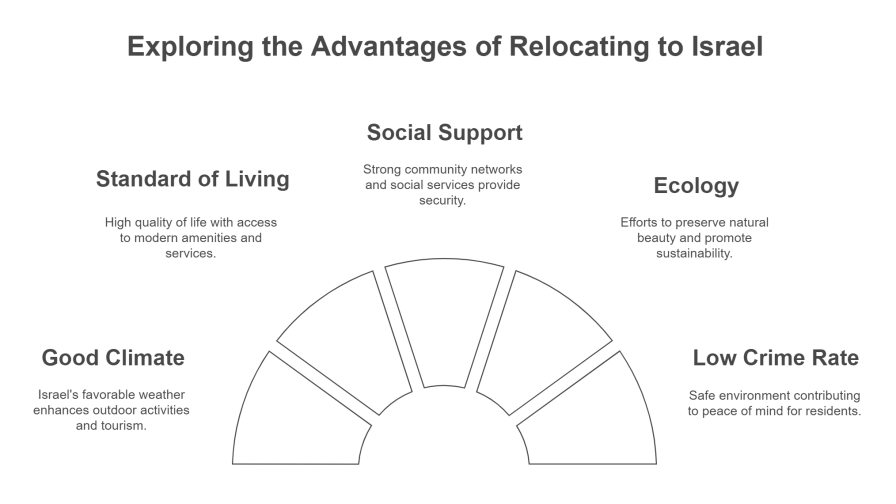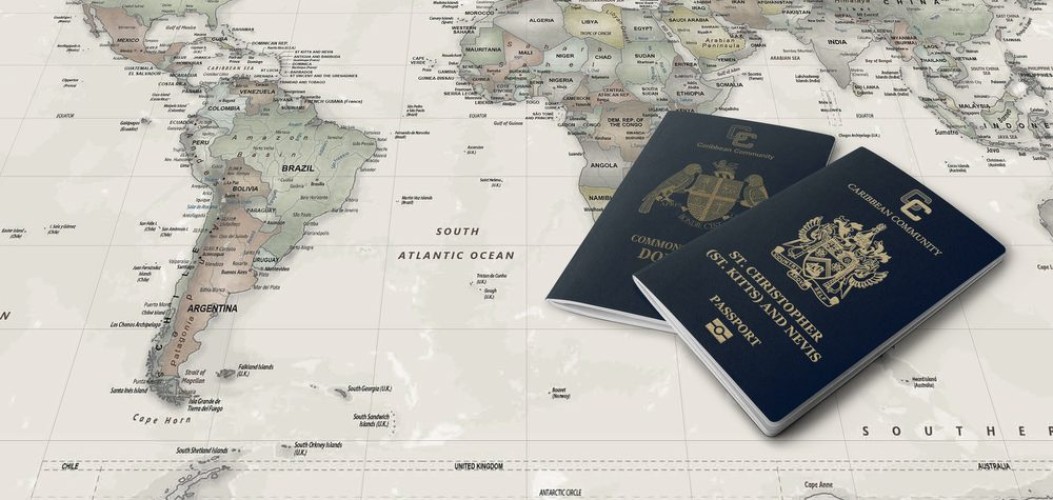Despite the unstable situation in the region, the number of people who want to choose it for a permanent life is not decreasing. It is even growing every year. How does this happen? The main flows of immigrants come here due to the repatriation program. It assumes the presence of at least some connection with Jewish roots. Read on to know more about the nuances of moving to Israel.
Who can move to Israel
Foreigners with Jewish roots have a preferential right to move to the country and obtain citizenship. Such preferences are provided to the descendants of ancestors by a specially developed repatriation program, which is called “aliyah” in Hebrew. In the language of the Jews, people returning to his homeland are called “olim”, new repatriates are called “olim chadashim”.
The Law applies to the following categories of citizen
- Jews or Jewesses;
- Children and grandchildren of Jews;
- Spouses of Jews;
- Widows and widowers of Jews.
Benefits of moving to Israel
The country is among the leaders in the number of immigrants. If many people go there for permanent residence, then life is good there. Let’s outline the most significant advantages:

Good climate. Although the territory is small, here you can find a comfortable place to live and relax: long sea coasts, low mountains with fresh air. It is always warm here.
Standard of living. Qualified specialists are valued. They have high salaries and confidence in the future. It has some of the best healthcare and education systems in the world. Developed infrastructure, excellent roads, high-quality food make life comfortable and happy. Let’s add to all this ample opportunities to start and develop your own business.
Social support. Protection of the disabled, pensioners, the elderly and children has been brought to perfection. Everyone in need receives everything that is prescribed by law. A high level of medical care contributes to the prolongation of life. Today, Israel is among the leaders in the number of centenarians.
Ecology. The condition of water and air is under the constant control of supervisory authorities. In order to limit the emission of exhaust gases into the atmosphere, Israel has established a flexible system for regulating the number of cars on the roads.
Criminality. The Jewish state managed to almost completely eradicate crime. Kids can play anywhere with peace of mind without parental controls. It is wrong to talk only about advantages. The turbulent situation in the region is the main disadvantage of Israel. Excessively high temperatures in summer are another feature of the country. This time of year is not good for heart patients and weather-dependent people.
Types of visas
Foreign nationals, staying in Israel, are required to obtain a visa. There are several types of these documents. They are indicated by conventional letters and numbers. Visas differ in the duration of stay in the country. Let’s consider some of the most popular visas for visiting the country.
Temporary Resident Visa (A/1)
This document is issued by «olim hadash», who have not yet decided to settle in Israel. It gives the right to get a job and benefits. The visa can be extended for 5 years.
Student Visa (A/2)
It is issued to foreigners who have expressed a desire to study in the country’s institutions. In exceptional cases, this visa may entitle the student to employment.
Visa for Spouses and Children (A/4)
The document is issued to relatives of religious employees and students who have an A/2 visa.
Work Visa (B/1)
Although it is a tourist visa, it gives a foreign citizen the right to find a job. It’s better to take care of obtaining this document in advance. A regular tourist visa B/2 cannot be subsequently changed to B/1.
Cost of living
To get an idea of the cost of living in Israel, let’s show the average prices for the most important products and services in Tel Aviv. For convenience, we will make calculations in one currency – the euro.
- Rental housing. One-room apartment: 1,585 in the center; 1,180 in other areas of the city.
Two-bedroom apartment: in the center 2740; in other districts of the city 1,955.
In summer, prices rise due to the influx of tourists. This trend is also observed in large cities, where many immigrants come. - Real estate. It should be noted right away, that real estate in Israel can be bought by anyone from any country. In the city center, 1m2 will cost about 16,000, and in other areas of Tel Aviv – 10,750. For comparison, such housing in London will cost 15,600 and 9,570, respectively. Repatriates receive discounts and benefits from the state.
- Utilities. The amount of utility bills can be different, since housing in the city is not centralized. But on average, for heating, water, garbage, cooling, electricity in an apartment with an area of 80m2 comes out to about 230 per month. Add to this amount the cost of mobile communications, Internet, real estate tax, payment for the improvement of the local area.
- Food. The food basket, consisting of seven products necessary for a person, amounted to a total of 43 euros. Add to this a visit to an inexpensive restaurant, which may cost you 19 euros.
- Education. Tel-Aviv is singled out from the rest, as a priority. The city has set the task of maximizing the capabilities of students. The prices for education are as follows: kindergarten attendance 1,025 per month; primary school education 23,700 per year; university education from 2,790 to 5,480 per year, depending on the level of education obtained.
- Transport. The costs for public transport and taxis are about the same as in Europe. A monthly public transport pass is €58. Cars here are more expensive than in the countries of Western and Eastern Europe.
- Medical care. According to this indicator, Health Care ranked Israel 18th among 94 countries in 2024. Everyone is required to take out medical insurance. Payment for a month depends on the level of the clinic and the age of the citizen. For example, up to 30 years old, you need to pay from 15 to 23 euros per month. Interestingly, pensioners over 70 years old have to pay up to 95 euros.
- Clothing and footwear. In Tel Aviv, there are a large number of boutiques and shops offering these products. Despite the great competition, their prices are higher than in European cities. Jeans will cost 94 euros, and a summer dress 56 euros. Sneakers and men’s shoes cost 113 and 130 euros, respectively. Sometimes sales that offer a 50% discount save the day.
Planning Move
Moving to Israel is a responsible matter that must be taken seriously.
- Preparation of documents. This stage of preparation for immigration is very important. Even a paper that you think is insignificant can make a big difference. On the contrary, its absence can create problems for you. First, you need to prepare documents for consular inspection in order to pass it without repeated visits to diplomatic missions.
- Health insurance. Health insurance is mandatory for an applicant for an Israeli passport. This document should be taken care of in advance. You can start by considering options for short-term policies for immigrants.
- Learning Hebrew. Knowing the local language will make your life in Israel much easier. Think about the best way to take the Ulpan crash course.
- Participation in social and cultural life. Adaptation in a multinational country will be much faster if you take part in various events, visit exhibitions, museums, and establish contacts with people.
Finding accommodation
There is a lot of housing in Israel. You can find it on websites, in newspaper ads, through word of mouth. There is no need to immediately rent an expensive house until you have definitely resolved the issue with a device in Israel.
Take advantage of renting a duplex or apartment. It is usually provided for one year, but the conditions can be discussed with the owner. In Tel Aviv, renting a three-bedroom apartment for this period costs about 1550 US dollars.
Taxes for expats
Israel’s tax laws regarding immigrants are undergoing changes. This applies, first of all, to the “Milchen Law”. According to it, repatriates and re-emigrants who have been abroad for more than 10 years do not have to pay taxes on income earned abroad. The country’s tax authorities have repeatedly tried to repeal this law, but to no avail.
The country provides discounts on income tax in the form of preferential units (nekudot zikui). They have a fixed size and are summed up. The amount received is deducted from income tax. To imagine the benefits of the discount, let’s say that preferential units can completely zero income tax. To receive additional tax benefits, a repatriate can settle and work in the “city of development”. The list includes more than 450 settlements. Here, a repatriate can receive tax benefits of up to 20%, not counting those that he has.
Life in Israel
Prices for goods and services in Israel are generally higher than in Western European countries. But if you look at the size of income, even with the high cost of living, Israelis must feel better than Europeans. Judge for yourself: the cost of living for one person is 940 euros, and the average salary after taxes is 2,375 euros. Recall that repatriates are subject to income tax benefits.
The country has only 3% unemployment, and in terms of purchasing power, it ranks 30th in the world. This is an indicator of a decent standard of living even against the backdrop of high prices.
Healthcare system
Israel’s healthcare system is legendary. And she deserves it. Thanks to the country’s effective healthcare system, men live an average of 80 years, while women live 84 years.
The system is based on the activities of four health insurance funds (kupat-cholim): Clalit, Leumit, Maccabi and Meuhedet. Each repatriate is obliged to register in one of them. Health insurance is free for all citizens of the country. Repatriates receive additional benefits in receiving medical services:
- use the services of an interpreter;
- severely disabled people receive additional support;
- do not pay for insurance for a year;
- people with incomes below the subsistence level may not be able to pay health insurance premiums.
Priority conditions have been created for the children of repatriates in the provision of medical services.
How to join the medical care system as a new immigrant
A repatriate can become a Kupat-Holim subscriber upon arrival at the airport. If this cannot be done there, you can register with the Health Insurance Fund at any post office. If you have not used this option either, you will be able to register online on the National Insurance Institute website after three weeks. By this time, the Ministry of Internal Affairs will transfer information about you there. When you register at Kupat-Holim, you will be offered two packages to choose from:
- Basic. This package involves receiving medical services from the following doctors: therapist, gynecologist, orthopedist, dermatologist, ophthalmologist, otolaryngologist.
- The extended package provides solid discounts of up to 70% even for operations performed abroad. It also includes providing the patient with medicines, dental prosthetics, which are not provided for by the basic program.
Kupat-Kholim provides citizens with a full range of necessary services. But each cash register has its own nuances that you need to pay attention to.
How to choose a health insurance company
Before choosing kupat-cholim, we recommend paying attention to the following points:
- list of services offered;
- distance from your place of residence;
- qualification of doctors;
- accessibility for disabled people and pregnant women;
- how often there are queues.
The organisation of reception of citizens is one of the leading advantages of health insurance funds.
Aliyah and Israeli Citizenship
The term “Aliyah” refers to the time when Jews were returning from captivity. It means “exaltation” and carries a dual meaning. First, the word literally alludes to a return to Jerusalem, which is actually on top. Secondly, the term is used in a figurative sense, symbolizing the spiritual elevation of the nation.
Now this word refers to the program of repatriation of Jews to their historical homeland. Any person who has proven his closeness to the Jewish nationality can take advantage of the preferential program for obtaining Israeli citizenship. If there is a sincere desire to settle in Israel and observe its laws and customs, you can study the rules for obtaining Israeli citizenship by foreigners.
FAQ
The laws of the state in this matter are strict. But there are articles that allow a foreigner to obtain Israeli citizenship. The answer to this question can be obtained from lawyers.
You receive this status indefinitely. Travel documents, which have different validity periods, are extended.
It is difficult to give an unambiguous answer to this question. It all depends on your preferences, ambitions, profession, and property status. If you want more tax benefits, you can choose a settlement in the “city of development”. If funds allow, you can settle in Tel Aviv or another big city.





